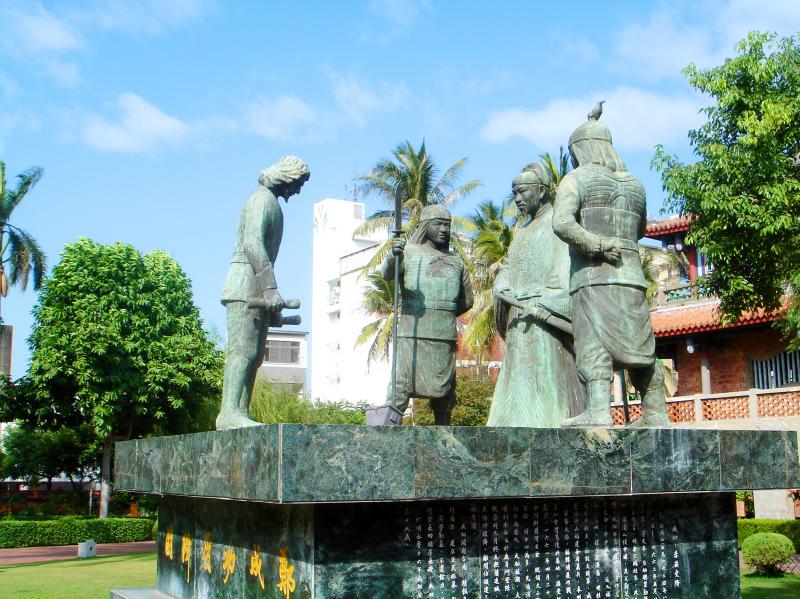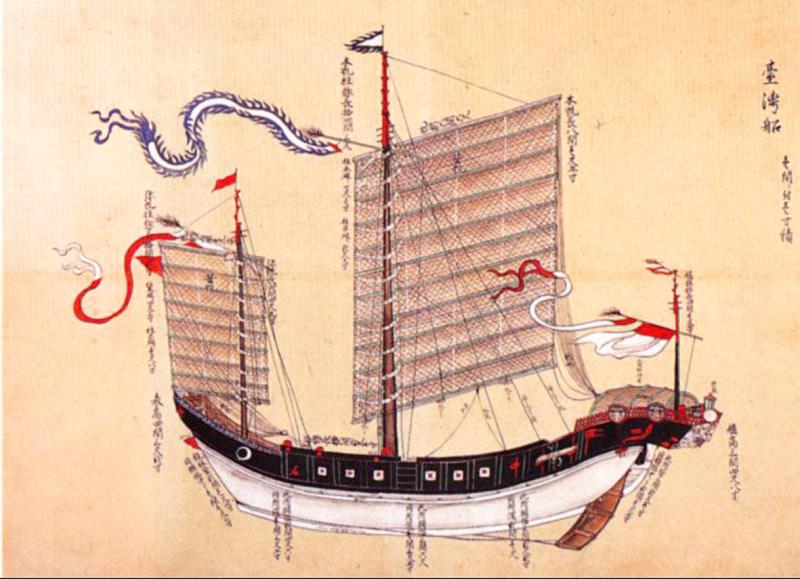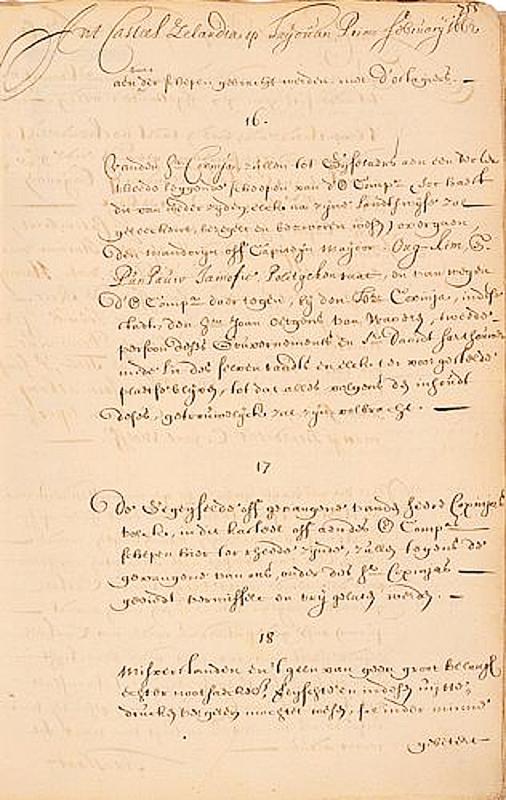Jan. 25 to Jan. 30
It was the beginning of the end when German sergeant Hans Jurgen Radis walked out of the Dutch-controlled Fort Zeelandia and surrendered to the besieging army of Cheng Cheng-kung (鄭成功, also known as Koxinga). The Dutch had already been trapped in the fort for nine months, and they were sick, hungry and in despair.
After one defection during the early days of the siege, Dutch commander Frederick Coyett set up checkpoints around the fort’s perimeter, in what is today’s Tainan. Radis told his bunkmate he was going hunting, but by the time they realized where he was headed, it was too late.

Photos courtesy of Wikimedia Commons
Tonio Andrade writes in How Taiwan Became Chinese that “Radis directed Cheng’s attention to a redoubt located on a hill above Fort Zeelandia. If Cheng could take it, he would be able to shoot directly into the company’s defenses and Zeelandia would be his.”
Cheng began constructing batteries for the operation, and Radis was seen at the fields providing his expertise. The Dutch could do nothing but watch.
On Jan. 25, 1662, Cheng rallied his troops for the final offensive and bombardment. Vastly overpowered, the Dutch blew up the fort and after discussing the matter, decided to surrender, ending their 38-year presence in Taiwan.

Photo courtesy of Wikimedia Commons
UNEASY RELATIONS
Just two decades after the Dutch established their presence in Taiwan in 1624, the Manchu armies had taken the Ming Dynasty capital of Beijing and been pushing southward against remaining Ming loyalists. Cheng was one of those opposed to the Manchus and their subsequent Qing Dynasty, and he camped in his stronghold of Xiamen, directly opposite Taiwan.
Cheng’s relations with the Dutch in Taiwan were cordial at first. Andrade writes that although Cheng would periodically request medical help from the Dutch, there remained deep distrust between the two parties. Some suspected that Cheng was eyeing Taiwan as a base in case he was driven from China. However, the relationship would grow rocky as Cheng began asserting that Taiwan’s Han inhabitants were under his jurisdiction, and blockaded trade between China and Taiwan.

Photo courtesy of Wikimedia Commons
A disastrous attempt to take Nanjing in 1659 left Cheng’s “prestige and organization shattered,” Andrade writes. The Qing threatened to execute anyone who dared trade with him, and were able to disrupt his business networks through a defector. Meanwhile, other centers of Ming loyalism were collapsing, allowing the Qing to focus more on Cheng.
Cheng repelled the first Qing offensive on Xiamen, but he needed new options.
Enter Ho Ting-pin (何廷斌, some sources show him as Ho Pin), who was a wily character. He could speak Dutch and was wealthy and well-connected; his brethren described him as a man with a “greedy appetite and “bottomless stomach.” Ho was the go-to guy when the Dutch needed to communicate with Cheng.
However, in 1659, Ho was caught cheating in a tax-farming auction and later discovered to be illegally collecting tolls from Chinese ships leaving Taiwan. The second offense was serious because it led to diminished trade, as captains were unwilling to pay. Furthermore, the Dutch found that the money was being funnelled to Cheng. Ho fled to Xiamen with his family, leaving a huge amount of debt in Taiwan.
But most importantly, he gave Cheng a map of Taiwan and told him of its riches. Two years later, Cheng announced that Taiwan was a “vast fertile land with revenues of several hundred thousand taels per year.”
“If we concentrate our skilled people there we could easily build ships and make weapons. Of late it has been occupied by the red-haired barbarians, but they have less than a thousand people in their fortress. We could capture it without lifting a hand. I want to conquer Taiwan and use it as a base.”
ASSAULT ON ZEELANDIA
In Taiwan, rumors had swirled of Cheng’s imminent invasion for over a year. On April 30, 1661, the Dutch spotted Cheng’s fleet heading toward them, while Taiwan’s Han inhabitants rushed to help the troops disembark.
The Dutch attempted to slow Cheng’s landing, hoping for the same success they enjoyed when they routed the much larger Kuo Huai-yi (郭懷一) rebels in 1652. But these weren’t angry peasants: they were battle-hardened soldiers.
Cheng’s army quickly took Fort Provintia, and for the next few days Aboriginal chiefs from the area came and pledged their allegiance. The Dutch could do nothing but hold out in Fort Zeelandia, which had powerful walls that withstood Cheng’s cannons.
The siege went on for months, and when 700 soldiers arrived from Batavia to relieve the Dutch, Cheng turned his anger toward Ho, who had told him that the battle would be easy and food was plentiful in Taiwan. In reality, there was barely anything to eat, and Cheng’s men had to find land to farm, which led to countless clashes with Aborigines. Ho “was stripped of his honors” and sent to “live in a small thatched hut, with orders to never show his face again,” Andrade writes. Cheng’s men routed the reinforcements, and the situation in the fortress became increasingly desperate, as the Dutch tried to unsuccessfully ally with the Qing.
Initially Cheng was not planning to launch a final attack until the spring of 1662, but heard that the Dutch had successfully contacted the Qing and formed an alliance. Whether this was true or not, Cheng felt that he had to act immediately.
Radis appeared at just the right time. While Coyett squarely blames the fall of Fort Zeelandia on the defector, some argue that the experienced Cheng had already known about the redoubt.
Nevertheless, Radis’s familiarity with the fort and advanced artillery knowledge did play a part, as it was his European-style battery that proved to be the most devastating during the bombardment. The Dutch discussed holding out and waiting for reinforcements, but ultimately walked out holding a white flag.
Taiwan in Time, a column about Taiwan’s history that is published every Sunday, spotlights important or interesting events around the nation that either have anniversaries this week or are tied to current events.

April 14 to April 20 In March 1947, Sising Katadrepan urged the government to drop the “high mountain people” (高山族) designation for Indigenous Taiwanese and refer to them as “Taiwan people” (台灣族). He considered the term derogatory, arguing that it made them sound like animals. The Taiwan Provincial Government agreed to stop using the term, stating that Indigenous Taiwanese suffered all sorts of discrimination and oppression under the Japanese and were forced to live in the mountains as outsiders to society. Now, under the new regime, they would be seen as equals, thus they should be henceforth

Last week, the the National Immigration Agency (NIA) told the legislature that more than 10,000 naturalized Taiwanese citizens from the People’s Republic of China (PRC) risked having their citizenship revoked if they failed to provide proof that they had renounced their Chinese household registration within the next three months. Renunciation is required under the Act Governing Relations Between the People of the Taiwan Area and the Mainland Area (臺灣地區與大陸地區人民關係條例), as amended in 2004, though it was only a legal requirement after 2000. Prior to that, it had been only an administrative requirement since the Nationality Act (國籍法) was established in

With over 80 works on display, this is Louise Bourgeois’ first solo show in Taiwan. Visitors are invited to traverse her world of love and hate, vengeance and acceptance, trauma and reconciliation. Dominating the entrance, the nine-foot-tall Crouching Spider (2003) greets visitors. The creature looms behind the glass facade, symbolic protector and gatekeeper to the intimate journey ahead. Bourgeois, best known for her giant spider sculptures, is one of the most influential artist of the twentieth century. Blending vulnerability and defiance through themes of sexuality, trauma and identity, her work reshaped the landscape of contemporary art with fearless honesty. “People are influenced by

The remains of this Japanese-era trail designed to protect the camphor industry make for a scenic day-hike, a fascinating overnight hike or a challenging multi-day adventure Maolin District (茂林) in Kaohsiung is well known for beautiful roadside scenery, waterfalls, the annual butterfly migration and indigenous culture. A lesser known but worthwhile destination here lies along the very top of the valley: the Liugui Security Path (六龜警備道). This relic of the Japanese era once isolated the Maolin valley from the outside world but now serves to draw tourists in. The path originally ran for about 50km, but not all of this trail is still easily walkable. The nicest section for a simple day hike is the heavily trafficked southern section above Maolin and Wanshan (萬山) villages. Remains of